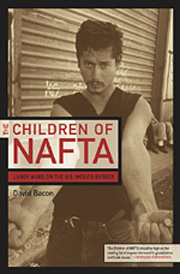 |
 |
 |
 Entertainment | Books | April 2007 Entertainment | Books | April 2007  
Book Review: The Children of NAFTA
 Alejandra Juarez - politicalaffairs.net Alejandra Juarez - politicalaffairs.net


| The Children of NAFTA: Labor Wars on the U.S./Mexico Border
by David Bacon
Berkeley, CA: University of California Press, 2005. For more info click HERE. |
Children of NAFTA chronicles the personal stories of workers who have been directly impacted by NAFTA. Inevitably this journey takes us up north where the agricultural and meatpacking industries of the US are being deeply affected as well as down south to the now expanding maquiladoras in states like Coahuila and Puebla. Just a few miles south of the border in the Mexicali Valley children spend their day on the onion fields instead of in the classroom. This is the site of the Muranaka Farms which was outsourced from Oxnard and Coachella, California.

"Child labor is not legal in Mexico, any more than it is in the United States" writes Bacon, however according to Gema López Limón, a local activist "child labor is growing as a result of the country’s successive economic crises and the rise in export-oriented agriculture". The number of children attending school is steadily decreasing as is the living standards of the workers there. As price of groceries and other essential foods have doubled and tripled since 1995 wages remain stagnant. This becomes the drive behind a company’s more than willingness to relocate south of the border; "Most of our operations are labor intensive, so we do save money on labor costs by comparison with the U.S." Muranaka management admits.

Similarly, the maquila industry has boomed since the passage of NAFTA in 1994. Although the motive behind its establishment in the early 1960’s was a benevolent one - to absorb the labor of returning braceros - the increasing pressure over foreign debt forced the Mexican government to open the country to foreign investors. "Maquiladoras furnish the second largest source of foreign exchange for the Mexican economy, after oil. This has created a culture in which anything favoring maquiladora production is emphasized, while the human cost is not addressed" states Professor Harley Shaiken. No case is more telling of this human tragedy than that at Han Young. Workers at Han Young de Mexico, a Hyundai factory, built chassis and metal shipping containers in exchange for poverty wages and at risk to their health. Bacon chronicles Han Young workers’ struggle to gain registro for an independent union in 1997. The two year fight that ensued would become "not only the most important battle in Tijuana’s history but a formative experience for workers throughout the border industry" emphasizes Bacon. This long and hard fought campaign for workers’ rights saw the rise of labor leaders, exposed the ineptitude and often coaxing relationship of government officials and corporations, and perhaps more significantly the coalescing of cross-border labor movements. Despite charges filed under NAFTA’s labor side agreement with the National Administrative Office (NAO) no resolution was obtained. Bacon points out that the flawed labor side agreement "has no provisions for penalties or fines against governments that violate workers’ union rights".

Unfortunately, these desperate conditions are not confined to factory workers. Such is the case of Cañon Buenavista and San Quintin residents who find themselves constantly intimidated by local authorities. Bacon writes of Beatriz Chávez and Julio Sandoval both arrested and imprisoned for despojo and despojo agravado which mean "using land or water belonging to someone else, without their authorization in a furtive manner" and "charges that a person has led or instigated others in committing despojo" respectively. Both Chávez and Sandoval helped organize workers to build homes, often out of whatever they could find, on vacant land. Although these arrests were unconstitutional Sandoval remains in prison because as he explains the indigenous from southern Mexico who make the rural work force of Baja California are targets of racism, persecution and treatment "as inferior and as a threat".

Moreover, these human rights violations not only take place on the US-Mexico border but deep inside Mexico. Bacon outlines the case of SUTAUR 100, Mexico City’s bus route 100 union, which became embroiled in the fight against privatization and free trade economic reforms. In 1996 after 11 of its leaders were jailed demonstrations engulfed Mexico City’s Zocalo demanding their release. The government had removed SUTAUR workers at gun point as it attempted to replace them with a union more favorable to their position. In the end, many leaders remained in prison and several workers had been murdered as the life of independent unions was coming to a close.

The mid 1980’s saw the implementation of neo-liberal policies in Mexico. Consequently, the country has witnessed devaluation in its currency, its markets flooded by cheap imports affecting local farmers, widespread unemployment, a downward spiral in living standards, assault on workers’ rights and the privatization of national industries just for the benefit of a few ultra-rich. In most cases labor violations occur not because there are no laws against them but rather because there is no implementation of the law.

In spite of international support and tri-national coalitions, workers’ rights continue to be attacked. As Bacon concludes, "When [NAFTA] went into effect…enforcing labor rights in Mexico became the responsibility of more than the Mexican government alone. All three NAFTA countries [agreed to the labor side agreement] in which each country pledged to enforce its own labor laws". Furthermore, as outsourcing intensifies there should be more solidarity and commitment to the struggle from all three countries. For "The fewer rights Mexican workers have, and the cheaper their labor gets, the more tempting it is for U.S. corporations to relocate production south". | 
 | |
 |



